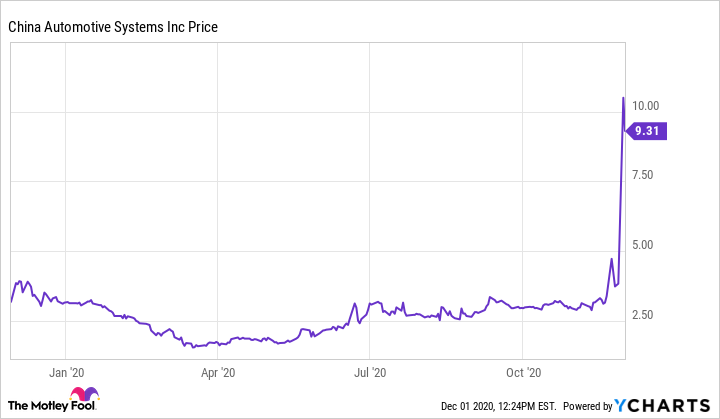What happened
Shares of China Automotive Systems (CAAS 3.39%), a leading supplier of power-steering components and systems within the Chinese automotive industry, are down over 10% Tuesday morning after a whirlwind couple of days. Here's some context around the price movement and what it means for investors.
So what
China Automotive Systems' decline Tuesday, likely driven by a strong analyst downgrade, needs additional context, including its recent surge higher. On Monday, the auto company announced it had shipped over 120,000 steering units for electric-vehicle (EV) models so far in 2020 and that it could surpass 140,000 units by the end of the year. Management is now targeting over 200,000 sales of steering units for 2021. Jie Li, chief financial officer of CAAS, said in a press release: "Our portfolio of EPS products has the potential to become a major growth channel over the next few years as we further capture market share in the burgeoning market for Chinese electric vehicles."

Image source: Getty Images.
Those comments and projections helped boost the stock price higher, and it's easy to imagine some investors simply taking profits today.
Now what
Another driving force behind China Automotive Systems' decline Tuesday is likely Greenridge Global analyst, William Gregozeski. He reversed his previous Buy recommendation to Sell while leaving his $4 price target unchanged, essentially suggesting the only thing that changed was the massive spike in share price. Gregozeski noted to investors he expected a "collapse back down to a more normalized valuation."
There is certainly reason to be optimistic about electric vehicles and especially China's growth over the past few years in the category. However, Monday also brought news that Kandi Technologies --another Chinese electric-vehicle producer -- had allegedly made "fake sales" to undisclosed affiliates of the company. There's no reason to think China Auto Systems has done anything wrong. But take a rapid surge in its stock price due to projections with a grain of salt and perhaps wait for a normalization of its stock price.


